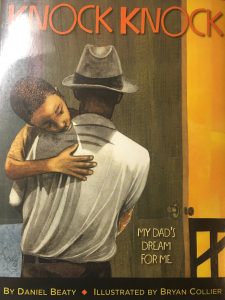Title: Knock, Knock: My Dad’s Dream for Me
 Author: Daniel Beaty
Author: Daniel Beaty
Illustrator: Bryan Collier
Publisher: Little, Brown and Company, 2013
Number of Pages: 40 pages
Tags:
Genre: Fiction
Analysis: In this story, a boy talks about his morning routine that involves his father knocking on his door to wake him up. However, his father doesn’t come to his door one morning because he is incarcerated. He waits patiently, but his father never shows back up. The rest of the story is told through a letter that his father writes him from jail describing the dreams he holds for his son. This book is a Coretta Scott King Award Winner.
This book serves as a mirror to the children who have an absent parent in their life for any reason. The story talks about the process of growing into adulthood while missing a parent. It is told from the child’s point of view, displaying the wide range of emotions that took place during these times. The child in the story never finds out where his father is, which can be representative of some children’s reality. However, as the story goes on we see the child grow in age and see him accomplish many things. For this reason, the book also serves as a door to its readers. It gives them courage to keep going when they might be scared without parental guidance. In the author’s note, we learn that the author created this book in regards to his own personal life. His father was placed in jail when he was only three years old.
The illustrations in this book are put together with collage materials and water colors, giving a feel for the Harlem area in which the story is set. There are other children’s faces used on the buildings. The images of the other children and sometimes clear and sometimes faded. Perhaps they are symbolic of memories fading away with time. The emotions on the narrator’s face are clear and add an element that is not described in the text. The father’s tie is present in the beginning of the book, but as the story goes on we see the main character put the tie on himself as he grows older. We also see the growth of the boy, symbolizing the time passing while his father is still gone. The structure of this book relies heavily on the letter the boy’s father sends him. The letter discusses many life lessons that a father can teach his son such as shaving for the first time. The father tells the boy to knock down doors that  he couldn’t, as well as knock to open the doors to his dreams. This element ties into the game they used to play when he as a child. Ideologically, this book has many important lessons. While it speaks to the children who have lost a parent, it also aims to show hope, the importance of making good decisions, and to not let a past define a future. This book speaks to all children who may have the odds stacked against them. Some people may believe that this book is stereotypical because the father, an African American, is sent to jail. However, I believe that this book is great for all children, regardless of their situation.
he couldn’t, as well as knock to open the doors to his dreams. This element ties into the game they used to play when he as a child. Ideologically, this book has many important lessons. While it speaks to the children who have lost a parent, it also aims to show hope, the importance of making good decisions, and to not let a past define a future. This book speaks to all children who may have the odds stacked against them. Some people may believe that this book is stereotypical because the father, an African American, is sent to jail. However, I believe that this book is great for all children, regardless of their situation.
